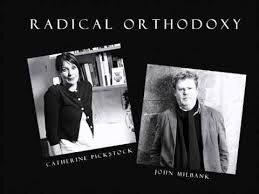In 1970, when Ivan Illich was enjoying, and suffering a moment of world-wide celebrity, he explained to me what he thought had caused this vogue. His views were so utterly orthodox, he said, and so deeply rooted in the first Christian millennium that he appeared enticingly radical to contemporaries who had completely lost touch with these roots. Perhaps it was this remark that persuaded me to pay attention when I first heard, nearly thirty years later, of a theological movement called Radical Orthodoxy. It began when my friend Lee Hoinacki urged me to read Catherine Pickstock’s book After Writing: On the LIturgical Consummation of Philosophy. From there I was led to John Milbank’s Theology and Social Theory, the manifesto-like magnum opus that first announced this new tendency, and to an anthology called Radical Orthodoxy in which these two writera and co-conspirator Graham Ward were joined by other thinkers who shared their view that the gateway to the future lies in a reappropriation of a misappropriated past. In 2006, on a visit to England, I was able to interview Pickstock and Milbank and to present the following thumbnail sketch of their thinking. Pickstock had been up with a sick child the night before she met me at her Cambridge college and insisted that she was barely compos mentis, but, in my view, she rose admirably to the occasion. Later, I met John Milbank at his home in Southwell, a old cathedral own in Nottinghamshire that I had known of old because my mother’s family came from nearby Mansfield. Five years later, I interviewed Milbank again, for a more extensive treatment of his thinking. That program can be found on this site in the series called The Myth of the Secular.
